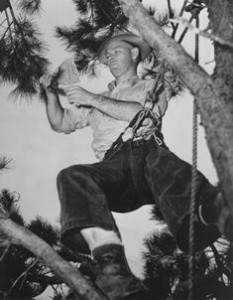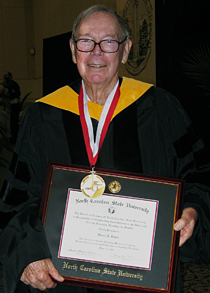NEWS RELEASE – For Immediate Release
 A recent study from North Carolina State University shows that while the number of visits to state parks across the country has grown, fund support for park operations has been significantly reduced. The reduction in funding during a time of park growth endangers the more than $20 billion in economic impact that state parks have on the nation’s economy.
A recent study from North Carolina State University shows that while the number of visits to state parks across the country has grown, fund support for park operations has been significantly reduced. The reduction in funding during a time of park growth endangers the more than $20 billion in economic impact that state parks have on the nation’s economy.
“Obviously the reduction in general-fund support for operations puts stress on America’s state-park systems,” says Dr. Yu-Fai Leung, NC State associate professor of recreation ecology, park planning and visitor management, and director of the study.
“This is a troubling trend since states rely heavily on outdoor recreation and tourism spending to fuel local economies. The public has high expectations of state parks and the facilities and programs offered. If the state parks don’t meet expectations, visitors will likely take their business elsewhere.”
Leung, alongside fellow NC State researcher Dr. Chris Siderelis, completed the Annual Information Exchange (AIX) report, which tabulates data on state park attendance and economic impact, for the National Association of State Park Directors.
State parks nationally are generating a nine-fold return on their annual operating investment during difficult economic times. Many private- and public-sector jobs depend on the vitality of public parks; placing them at risk only aggravates the economic stress on state economies, Leung says. Total operating expenditures for state parks from all sources add up to about $2.2 billion, the report asserts. State general funds represent about $810 million of that $2.2 billion.
State parks operated 1,257 new areas, or more than 23,800 acres, over the previous year. “What that means is they have more land, facilities and visitors at a time when budget cuts are in double digits,” Leung explains. “It is unlikely that any private-sector business would cut expenditures when visitation and economic impact are growing. The prudent business plan would be to have stable or increased funding during periods of growth to protect the increasing market share.”
The AIX report shows that visitation to America’s state parks has grown from about 727 million visits in 2009 to more than 740 million in 2010 – a 1.6 percent increase. During the same period, general-fund support for park operations was reduced by $114 million or about 12.3 percent. Day-use visitation to state parks increased by more than 17 million or 2.6 percent while overnight visits dropped from 64 to 60 million. “The price of gasoline and pressure on household budgets are likely reasons for the 5.3 percent reduction in overnight visits,” Leung says.
Researchers are currently conducting statistical analyses on the AIX data to identify patterns and trends about state park use and operations.
NC State’s Department of Parks, Recreation & Tourism Management is part of the university’s College of Natural Resources.
AIX 2009-2010 Summary & Comparison ( DOC ) ( PDF )
For more information contact:
Yu-Fai Leung, Parks Recreation & Tourism Managment, 919.
Caroline Barnhill, News Services, 919.515.6251






